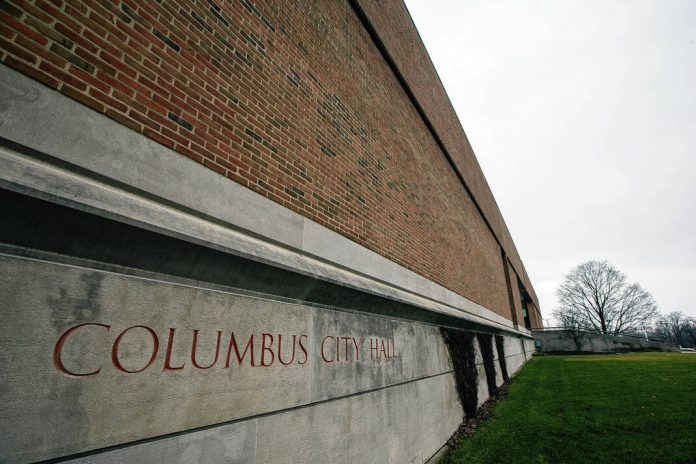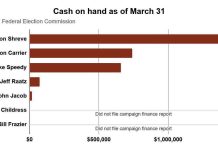Columbus’ downtown parking commission wants to end its free parking trial after hearing from some downtown merchants that the experiment has been more of a hindrance than a help.
The Columbus Parking Commission voted Thursday to recommend that the city revert to its previous parking enforcement area and practices downtown. The vote was 4-1, with commission member and Bartholomew County Public Library Director Jason Hatton voting against the action.
In order to become effective, the recommendation will need to be approved by the Columbus Board of Works. Commission member and downtown merchant Jeff Baker, who made the motion, suggested July 1 as a date when the change could go into effect.
In December, the Columbus Board of Works voted to approve the commission’s recommendation that a number of downtown side streets move from three-hour limits to free, all-day parking on a trial basis. This went into effect in mid-January, with city officials saying they would monitor how the change affects parking space availability on Washington Street.
According to Executive Director of Public Works Dave Hayward, the following areas were included in the initial trial: Fourth Street from Jackson to Franklin, Fifth Street from Jackson to Franklin, Sixth Street from Jackson to Franklin and Seventh Street from Jackson to Franklin.
In March, the Board of Works approved another commission recommendation, this time to remove three hour time limits on Jackson Street from Second to Fifth Street on an experimental basis.
The decision to recommend an end to these trial runs and revert the areas to three-hour parking came after a lengthy discussion, in which downtown businesses — including YES Cinema and The Cole Apartments, which are both located along Jackson — said that removing the limits has worsened their problems with parking availability.
“I never thought I’d get upset about the hour parking getting removed,” said Cole property manager Jenny Baker.
Hayward said that after hearing from The Cole initially, he began checking in on the Second to Third Street block of Jackson at random times and days. There was one week where it was not full, but the rest of the time, it was completely full. He added that the block from Third to Fourth Street was “100% full every day.”
“That was definitely the same cars,” he said. “There are a couple of distinctive cars that you can just tell that it was the same one, and they were there every day.”
Since the commission formed, the issue of downtown employees using up on-street parking — in some cases, all day long — has been a topic of much discussion.
During Thursday’s meeting, some merchants indicated that this is a problem among Cummins, Inc employees in particular, despite the company having a private parking garage and multiple lots. Jenny Baker said that they’ve also had issues with these workers using spaces in the Second Street parking garage that are designated for The Cole instead of the ones that are reserved for Cummins.
“The problem are the Cummins employees, which take advantage of everything that’s there,” said Hatton. “And I just, it’s frustrating because I don’t think any system we’re going to put in place is going to fix anything. We’re just putting jig-saw puzzles around. We’re just moving this to here and this to here and this to here, and we’re not solving the problem. And that’s frustrating.”
Beth Stroh, owner of Viewpoint Books, expressed concerns about the availability of convenient parking spaces near her store, saying that when she arrived at her store before 8 a.m. on Thursday, every spot on Sixth Street was taken. She added that the occupants were not Cummins employees but instead were other downtown workers or residents.
“We can’t survive if we don’t have parking,” she said. “And almost everyday, there’s no place to park (on Sixth Street) when I arrive at the store. And the same cars are in those spots when I leave at the end of the day, if I leave at a normal time.”
When asked if they wanted parking to go back to the way it was before, Jenny Baker and Stroh both said yes. However, Stroh added that she believes there are “better alternatives,” pointing to Holland, Michigan as a possible model. According to the website for downtown Holland, customers can park for free on the street and in all public lots and parking decks downtown.
“With that in mind, Downtown Holland employees and residents should refer to the appropriate parking maps and information above,” the site states. “Employee parking is only allowed in public lots and not in customer lots (as signed) and overnight parking in Downtown Holland is limited to residents only. An overnight parking permit is required.”
Stroh added that another solution might be to see if other downtown employers can come to an agreement with Cummins that allows their workers to park in areas owned by the company.
The commission also asked the opinion of Karen Hauber, a Columbus Police Department employee who works in parking enforcement. She said that while there has been a decrease in parking along Washington Street, there has been an big uptick on east-west side streets. She added that no matter what solution the commission chooses, it will not please everyone.
When asked if the parking situation is better now then it was before, Hauber replied, “This kind of came at a time of after COVID. And after COVID, everything is different. It all is going to fall back on when Cummins comes back to work full-time.”
In discussing the proposal to reinstate time limits, Sara Foreman, the CPD’s representative on the commission, expressed some concerns about communication.
“The constant changing, it confuses everybody,” she said. “I still have customers that aren’t aware that there are free parking spaces.”
Baker suggested that one option might be to give out warning tickets during the first couple of weeks after the limits are reinstated, similar to how CPD gives people an initial warning ticket for their first parking infraction of the year.
Following the vote, Hayward asked what the commission’s next steps are, adding that he agrees with Hatton’s concerns about what will happen in the long term.
“I don’t have an answer to that,” said Columbus City Councilman and Commission Chairman Tom Dell. “We hired a consultant, or the Redevelopment Commission did, that came back us and told us that we ought to go back with paid parking. No one seemed to agree with it. That wasn’t the way we wanted to proceed. So at this point, going back to what we have at this point, is as best we got.”
However, he added that he believes paid parking makes more sense than the current three-hour system, and he’s heard from some of his own customers that they would be willing to pay a “marginal fee” for parking.
Nelson/Nygaard recently conducted an update to its 2013 downtown parking study at the request of the parking commission. Due to the commission’s inability to contract or receive funds, the work was funded through a $19,470 grant from the Columbus Redevelopment Commission to the Board of Works, with the latter serving as the contracting entity.
The firm’s recommendations included implementing paid pricing as a way to increase the availability of spaces. After hearing a report from Nelson/Nygaard in June, the commission discussed the possibility of moving forward with paid parking but tweaking some of the firm’s recommendations, including prices for paid parking.
Nelson/Nygaard recommended a initial rate of $1 per hour, with this being adjusted over time. Additionally, the firm stated that officials should “ensure that the selected meter vendor can accommodate progressive rates, and increase the hourly rate to $2 after two hours of duration.”
In August, the parking commission discussed a set of draft recommendations on paid parking, which Hayward compiled based on what he had heard at previous meetings. Under the recommendations, parking for three hours would cost $1 an hour, the fourth and fifth hours would be $5 each, and every hour after would be $10 — meaning that someone who parks for nine hours would accumulate a charge of $53.
The proposal was met with opposition from some downtown merchants, including Jaime Mustaine, who said it would “destroy the downtown.” At one November meeting, Stroh said she was also against the idea and suggested seeing what would happen with turnover “if parking is free for a while.”
“When the rates came out, it sound like we were actually going to charge more for people to park in the street than if they got a spot in the parking garage,” she said at Thursday’s meeting.
Hatton said he believes there was a misconception about the charges. However, Baker said Stroh’s understanding was correct, as the commission wanted to encourage people to move into the Jackson Street parking garage.
According to the redevelopment department’s website, paid parking is in effect at the garage from 6 a.m. to 8 p.m. Monday through Friday. The garage’s daily rates are as follows:
—Up to 1 hour — Free
—From 1 hour up to 3 — $1
—From 3 hours up to 5— $2
—From 5 hours up to 7 — $3
—From 7 hours up to 9 — $4
—From 9 hours up to 14 — $5
Gary Thompson with REI, which manages the garage, said in a previous interview that each price indicates a flat amount rather than a per-hour rate.
“The maximum you will pay daily on a single visit is $5,” he explained.
At Thursday’s meeting, Dell said, “It (on-street parking) wouldn’t have been substantially more expensive, though their recommendations, I thought, was a little steeper.”
“That was the only information that some of us had, was what was out there in terms of that rate,” said Stroh. “If you invite people to come and explain why that would resolve some of these other issues, happy to be there. I would even support if if I could understand it. But it hasn’t always been eager to figure out when you’re meeting, when this information’s being shared.”
Linda Allman, events coordinator at YES, said that having paid parking makes sense to her.
“I think people are going to think twice about if they’re going to park there all day long, like they’re doing now,” she said.
Dell said that he can contact Bloomington city government and see if they have someone who can come to Columbus to discuss what their city has experienced with paid parking. Jeff Baker suggested that they should also bring in a retailer as well.
“I think it does help to have a real, ‘This is what we went through,’” Hatton said.





